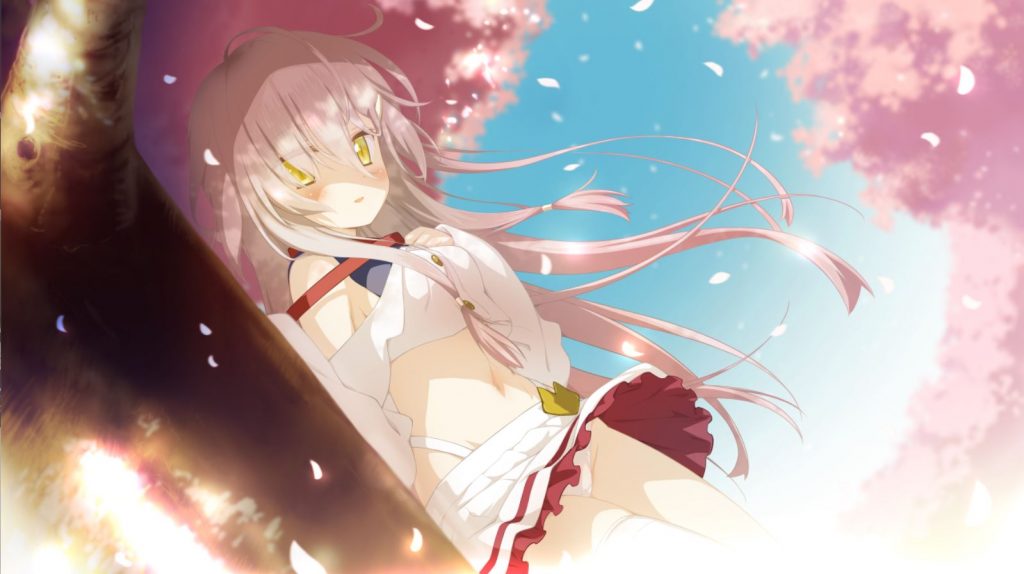
Long, long, long. But deep deep deep.
This review may contain some mild conceptual/structural spoilers to the work. Any express spoilers are marked.
Sakuramoyu presents an intricate, grand story told frequently through verbose, repetitive prose. The result is something awe-inspiring, but the experience may not be the most enjoyable. At its core, Sakuramoyu is a nakige which moonlights as a complex, mechanics-driven work (comparable to Island, where its world is as mysterious as it is deep). Character routes (all with maybe the exception of one) have a compelling dramatic, satisfying resolution and develop the work’s core philosophies. Sakuramoyu is not without its flaws, as it suffers from atrocious pacing and repetitive writing; it could have been categorically better if it were edited more. While Sakuramoyu is admirable as it is, it had the components of a masterpiece – lacking only in execution.

At its core, Sakuramoyu is a lachrymose work. Prior to reading it, I had read secondhand that the emotional climaxes of each route was comparable in intensity to the climaxes of various other kamige (arguable veracity). For the reader to truly feel sadness, I think that the reader has to be immersed – accepting the tale and studiously awaiting each development. Repetitive writing — or writing that essentially conveys the same information multiple times within a short period adversely affect how invested the reader can be in the work. There were moments in Sakuramoyu when I wanted to feel alongside the protagonist, but I couldn’t – not because the content of the writing was bad, but because I was too irritated or zoned out by that point. Indeed, at one point, I felt as if I had learned absolutely nothing new during the 2-3 hours of the reading session – as if I was lost in a fever dream. This point is exacerbated by Urushibara’s penchant to ignore common directing convention – not stopping the scene when the ‘natural’ stop spot was, making some scenes feel needlessly long (although I’ve read from others that they really liked this aspect of the work).
Although I was unable to get as emotionally-invested as I wanted to in the work, I still admire it for its depth – of its world, but also, of the themes that it seeks to develop and convey. On one hand, the events within Sakuramoyu occur within an ever-so complicated universe – delineating the nature of this world is crucial to understanding its plot. Urushibara develops this world meticulously, as if he had set out with the goal of writing a grand mystery work. He does this as other authors do, through a multi-route mystery structure, where the reader gradually learns more about the world until the final revelations in the true route. But, Urushibara skirts convention by actually making the secondary routes good in themselves – complete on their own. The true route is in effect, the culmination of all that is good about the work; its revelations improve on each route, as opposed to rendering them meaningless. The world which Urushibara seeks to develop is so vivid and complex, that there are entire articles devoted to piecing together the plot – to make sense of it.

Simultaneously, Urushibara imbues his characters’ actions with meaning. The central theme in Sakuramoyu is sacrifice, with a lesser theme concerning the idea of heroism. Each route is thematically meaningful in some shape or form, providing the reader with a clean, straightforward picture of Urushibara’s intended worldview by the end of the work. The characters themselves are likable, with ample time devoted to fleshing them out (for better or worse, the work goes into painstaking detail about the connectedness of the characters). Because of this, whenever something bad happens to the characters, the reader really feels the impact – similarly, when characters have their happy ending, the reader is all the more joyous.
At the end of the day, I didn’t like Sakuramoyu as a nakige – indeed, I don’t know how much I personally felt when I read it (… aside from frustration). Nonetheless, I admire the work because of its depth and its artistic license – there’s something profound about an author, in this case Urushibara, establishing a vision of a work and materializing that – in spite of whatever flaws critics might find. At the end of the day, Sakuramoyu feels like a passion project – and that I think, is special (especially with the state of the current industry).
After
This entry was written differently than my usual entry, which is written immediately after the read. I finished this work on 2020-06-30, meaning that I had some time to reflect on the subject matter.
I believe that the better the reader is at Japanese, the more willing the reader will be to forgive the repetitive/bloatedness. This is because the better you are at the language, the faster you’re able to read; your reception of the work is going to be more positive if it doesn’t feel like it drags on too much.
Despite its flaws, I think that Sakuramoyu is a special work – it’s a work that gets better after you finish it, because frustration is the most transient of all emotions. In time, all that remains is the good.